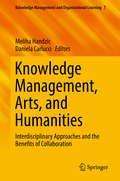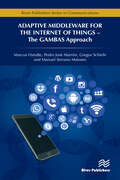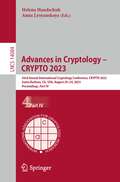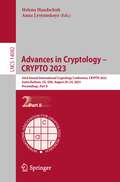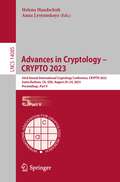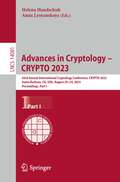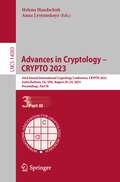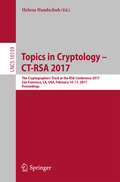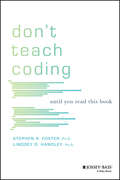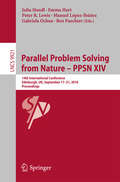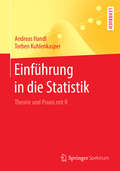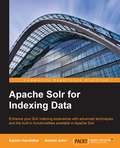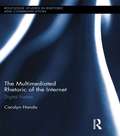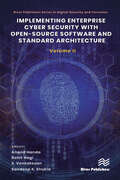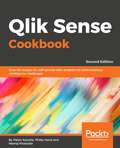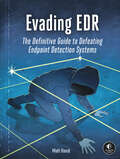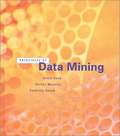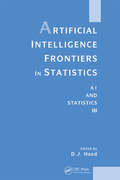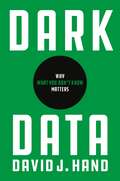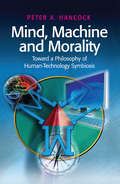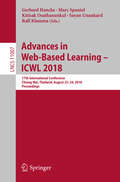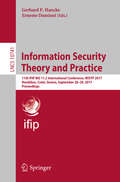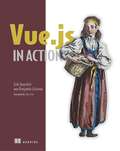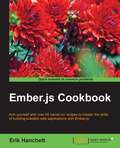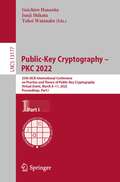- Table View
- List View
Knowledge Management, Arts, and Humanities: Interdisciplinary Approaches and the Benefits of Collaboration (Knowledge Management and Organizational Learning #7)
by Meliha Handzic Daniela CarlucciThis book presents a series of studies that demonstrate the value of interactions between knowledge management with the arts and humanities. The carefully compiled chapters show, on the one hand, how traditional methods from the arts and humanities – e.g. theatrical improvisation, clay modelling, theory of aesthetics – can be used to enhance knowledge creation and evolution. On the other, the chapters discuss knowledge management models and practices such as virtual knowledge space (BA) design, social networking and knowledge sharing, data mining and knowledge discovery tools. The book also demonstrates how these practices can yield valuable benefits in terms of organizing and analyzing big arts and humanities data in a digital environment.
Adaptive Middleware for the Internet of Things: The GAMBAS Approach
by Marcus Handte Pedro José Marrón Gregor Schiele Matoses Manuel SerranoOver the past years, a considerable amount of effort has been devoted, both in industry and academia, towards the development of basic technology as well as innovative applications for the Internet of Things. Adaptive Middleware for the Internet of Things introduces a scalable, interoperable and privacy-preserving approach to realize IoT applications and discusses abstractions and mechanisms at the middleware level that simplify the realization of services that can adapt autonomously to the behavior of their users. Technical topics discussed in the book include:Behavior-driven Autonomous ServicesGAMBAS Middleware ArchitectureGeneric and Efficient Data AcquisitionInteroperable and Scalable Data ProcessingAutomated Privacy PreservationAdaptive Middleware for the Internet of Things summarizes the results of the GAMBAS research project funded by the European Commission under Framework Programme 7. It provides an in-depth description of the middleware system developed by the project consortium. In addition, the book describes several innovative mobility and monitoring applications that have been built, deployed and operated to evaluate the middleware under realistic conditions with a large number of users. Adaptive Middleware for the Internet of Things is ideal for personnel in the computer and communication industries as well as academic staff and research students in computer science interested in the development of systems and applications for the Internet of Things.
Advances in Cryptology – CRYPTO 2023: 43rd Annual International Cryptology Conference, CRYPTO 2023, Santa Barbara, CA, USA, August 20–24, 2023, Proceedings, Part IV (Lecture Notes in Computer Science #14084)
by Helena Handschuh Anna LysyanskayaThe five-volume set, LNCS 14081, 140825, 14083, 14084, and 14085 constitutes the refereed proceedings of the 43rd Annual International Cryptology Conference, CRYPTO 2023. The conference took place at Santa Barbara, USA, during August 19-24, 2023.The 124 full papers presented in the proceedings were carefully reviewed and selected from a total of 479 submissions. The papers are organized in the following topical sections: Part I: Consensus, secret sharing, and multi-party computation; Part II: Succinctness; anonymous credentials; new paradigms and foundations; Part III: Cryptanalysis; side channels; symmetric constructions; isogenies; Part IV: Faster fully homomorphic encryption; oblivious RAM; obfuscation; secure messaging; functional encryption; correlated pseudorandomness; proof systems in the discrete-logarithm setting.
Advances in Cryptology – CRYPTO 2023: 43rd Annual International Cryptology Conference, CRYPTO 2023, Santa Barbara, CA, USA, August 20–24, 2023, Proceedings, Part II (Lecture Notes in Computer Science #14082)
by Helena Handschuh Anna LysyanskayaThe five-volume set, LNCS 14081, 140825, 14083, 14084, and 14085 constitutes the refereed proceedings of the 43rd Annual International Cryptology Conference, CRYPTO 2023. The conference took place at Santa Barbara, USA, during August 19-24, 2023.The 124 full papers presented in the proceedings were carefully reviewed and selected from a total of 479 submissions. The papers are organized in the following topical sections: Part I: Consensus, secret sharing, and multi-party computation; Part II: Succinctness; anonymous credentials; new paradigms and foundations; Part III: Cryptanalysis; side channels; symmetric constructions; isogenies; Part IV: Faster fully homomorphic encryption; oblivious RAM; obfuscation; secure messaging; functional encryption; correlated pseudorandomness; proof systems in the discrete-logarithm setting.
Advances in Cryptology – CRYPTO 2023: 43rd Annual International Cryptology Conference, CRYPTO 2023, Santa Barbara, CA, USA, August 20–24, 2023, Proceedings, Part V (Lecture Notes in Computer Science #14085)
by Helena Handschuh Anna LysyanskayaThe five-volume set, LNCS 14081, 140825, 14083, 14084, and 14085 constitutes the refereed proceedings of the 43rd Annual International Cryptology Conference, CRYPTO 2023. The conference took place at Santa Barbara, USA, during August 19-24, 2023.The 124 full papers presented in the proceedings were carefully reviewed and selected from a total of 479 submissions. The papers are organized in the following topical sections: Part I: Consensus, secret sharing, and multi-party computation; Part II: Succinctness; anonymous credentials; new paradigms and foundations; Part III: Cryptanalysis; side channels; symmetric constructions; isogenies; Part IV: Faster fully homomorphic encryption; oblivious RAM; obfuscation; secure messaging; functional encryption; correlated pseudorandomness; proof systems in the discrete-logarithm setting.
Advances in Cryptology – CRYPTO 2023: 43rd Annual International Cryptology Conference, CRYPTO 2023, Santa Barbara, CA, USA, August 20–24, 2023, Proceedings, Part I (Lecture Notes in Computer Science #14081)
by Helena Handschuh Anna LysyanskayaThe five-volume set, LNCS 14081, 140825, 14083, 14084, and 14085 constitutes the refereed proceedings of the 43rd Annual International Cryptology Conference, CRYPTO 2023. The conference took place at Santa Barbara, USA, during August 19-24, 2023.The 124 full papers presented in the proceedings were carefully reviewed and selected from a total of 479 submissions. The papers are organized in the following topical sections: Part I: Consensus, secret sharing, and multi-party computation; Part II: Succinctness; anonymous credentials; new paradigms and foundations; Part III: Cryptanalysis; side channels; symmetric constructions; isogenies; Part IV: Faster fully homomorphic encryption; oblivious RAM; obfuscation; secure messaging; functional encryption; correlated pseudorandomness; proof systems in the discrete-logarithm setting.
Advances in Cryptology – CRYPTO 2023: 43rd Annual International Cryptology Conference, CRYPTO 2023, Santa Barbara, CA, USA, August 20–24, 2023, Proceedings, Part III (Lecture Notes in Computer Science #14083)
by Helena Handschuh Anna LysyanskayaThe five-volume set, LNCS 14081, 140825, 14083, 14084, and 14085 constitutes the refereed proceedings of the 43rd Annual International Cryptology Conference, CRYPTO 2023. The conference took place at Santa Barbara, USA, during August 19-24, 2023.The 124 full papers presented in the proceedings were carefully reviewed and selected from a total of 479 submissions. The papers are organized in the following topical sections: Part I: Consensus, secret sharing, and multi-party computation; Part II: Succinctness; anonymous credentials; new paradigms and foundations; Part III: Cryptanalysis; side channels; symmetric constructions; isogenies; Part IV: Faster fully homomorphic encryption; oblivious RAM; obfuscation; secure messaging; functional encryption; correlated pseudorandomness; proof systems in the discrete-logarithm setting.
Topics in Cryptology – CT-RSA 2017
by Helena HandschuhThis book constitutes the refereed proceedings of the Cryptographer's Track at the RSA Conference 2017, CT-RSA 2017, held in San Francisco, CA, USA, in February 2017. The 25 papers presented in this volume were carefully reviewed and selected from 77 submissions. CT-RSA has become a major publication venue in cryptography. It covers a wide variety of topics from public-key to symmetric key cryptography and from cryptographic protocols to primitives and their implementation security. This year selected topics such as cryptocurrencies and white-box cryptography were added to the call for papers.
Don't Teach Coding: Until You Read This Book
by Lindsey D. Handley Stephen R. FosterThe definitive resource for understanding what coding is, designed for educators and parents Even though the vast majority of teachers, parents, and students understand the importance of computer science in the 21st century, many struggle to find appropriate educational resources. Don't Teach Coding: Until You Read This Book fills a gap in current knowledge by explaining exactly what coding is and addressing why and how to teach the subject. Providing a historically grounded, philosophically sensitive description of computer coding, this book helps readers understand the best practices for teaching computer science to their students and their children. The authors, experts in teaching computer sciences to students of all ages, offer practical insights on whether coding is a field for everyone, as opposed to a field reserved for specialists. This innovative book provides an overview of recent scientific research on how the brain learns coding, and features practical exercises that strengthen coding skills. Clear, straightforward chapters discuss a broad range of questions using principles of computer science, such as why we should teach students to code and is coding a science, engineering, technology, mathematics, or language? Helping readers understand the principles and issues of coding education, this book: Helps those with no previous background in computer science education understand the questions and debates within the field Explores the history of computer science education and its influence on the present Views teaching practices through a computational lens Addresses why many schools fail to teach computer science adequately Explains contemporary issues in computer science such as the language wars and trends that equate coding with essential life skills like reading and writing Don't Teach Coding: Until You Read This Book is a valuable resource for K-12 educators in computer science education and parents wishing to understand the field to help chart their children’s education path.
Parallel Problem Solving from Nature – PPSN XIV
by Julia Handl Emma Hart Peter R. Lewis Manuel López-Ibáñez Gabriela Ochoa Ben PaechterThis book constitutes the refereed proceedings of the 14th International Conference on Parallel Problem Solving from Nature, PPSN 2016, held in Edinburgh, UK, in September 2016. The total of 93 revised full papers were carefully reviewed and selected from 224 submissions. The meeting began with four workshops which offered an ideal opportunity to explore specific topics in intelligent transportation Workshop, landscape-aware heuristic search, natural computing in scheduling and timetabling, and advances in multi-modal optimization. PPSN XIV also included sixteen free tutorials to give us all the opportunity to learn about new aspects: gray box optimization in theory; theory of evolutionary computation; graph-based and cartesian genetic programming; theory of parallel evolutionary algorithms; promoting diversity in evolutionary optimization: why and how; evolutionary multi-objective optimization; intelligent systems for smart cities; advances on multi-modal optimization; evolutionary computation in cryptography; evolutionary robotics - a practical guide to experiment with real hardware; evolutionary algorithms and hyper-heuristics; a bridge between optimization over manifolds and evolutionary computation; implementing evolutionary algorithms in the cloud; the attainment function approach to performance evaluation in EMO; runtime analysis of evolutionary algorithms: basic introduction; meta-model assisted (evolutionary) optimization. The papers are organized in topical sections on adaption, self-adaption and parameter tuning; differential evolution and swarm intelligence; dynamic, uncertain and constrained environments; genetic programming; multi-objective, many-objective and multi-level optimization; parallel algorithms and hardware issues; real-word applications and modeling; theory; diversity and landscape analysis.
Einführung in die Statistik: Theorie und Praxis mit R
by Andreas Handl Torben KuhlenkasperDieses Lehrbuch motiviert und erklärt die Inhalte der deskriptiven und induktiven Statistik, indem es die mathematischen Grundlagen der Statistik mit vielfältigen, leicht nachvollziehbaren Anwendungen und Beispielen verbindet: Durch überschaubare Beispiele, die mit Papier und Stift durchgerechnet werden können (und sollten!) gewinnt der Leser zunächst Verständnis und einen routinierten Umgang mit den zentralen Formeln. Für größere Beispiele kommt das frei verfügbare statistische Software R zum Einsatz, welches die Berechnungen schnell und verlässlich auch für große Datensätze umsetzt.
Apache Solr for Indexing Data
by Sachin Handiekar Anshul JohriEnhance your Solr indexing experience with advanced techniques and the built-in functionalities available in Apache Solr About This Book * Learn about distributed indexing and real-time optimization to change index data on fly * Index data from various sources and web crawlers using built-in analyzers and tokenizers * This step-by-step guide is packed with real-life examples on indexing data Who This Book Is For This book is for developers who want to increase their experience of indexing in Solr by learning about the various index handlers, analyzers, and methods available in Solr. Beginner level Solr development skills are expected. What You Will Learn * Get to know the basic features of Solr indexing and the analyzers/tokenizers available * Index XML/JSON data in Solr using the HTTP Post tool and CURL command * Work with Data Import Handler to index data from a database * Use Apache Tika with Solr to index word documents, PDFs, and much more * Utilize Apache Nutch and Solr integration to index crawled data from web pages * Update indexes in real-time data feeds * Discover techniques to index multi-language and distributed data in Solr * Combine the various indexing techniques into a real-life working example of an online shopping web application In Detail Apache Solr is a widely used, open source enterprise search server that delivers powerful indexing and searching features. These features help fetch relevant information from various sources and documentation. Solr also combines with other open source tools such as Apache Tika and Apache Nutch to provide more powerful features. This fast-paced guide starts by helping you set up Solr and get acquainted with its basic building blocks, to give you a better understanding of Solr indexing. You'll quickly move on to indexing text and boosting the indexing time. Next, you'll focus on basic indexing techniques, various index handlers designed to modify documents, and indexing a structured data source through Data Import Handler. Moving on, you will learn techniques to perform real-time indexing and atomic updates, as well as more advanced indexing techniques such as de-duplication. Later on, we'll help you set up a cluster of Solr servers that combine fault tolerance and high availability. You will also gain insights into working scenarios of different aspects of Solr and how to use Solr with e-commerce data. By the end of the book, you will be competent and confident working with indexing and will have a good knowledge base to efficiently program elements. Style and approach This fast-paced guide is packed with examples that are written in an easy-to-follow style, and are accompanied by detailed explanation. Working examples are included to help you get better results for your applications.
The Multimediated Rhetoric of the Internet: Digital Fusion (Routledge Studies in Rhetoric and Communication #10)
by Carolyn HandaThis project is a critical, rhetorical study of the digital text we call the Internet, in particular the style and figurative surface of its many pages as well as the conceptual, design patterns structuring the content of those same pages. Handa argues that as our lives become increasingly digital, we must consider rhetoric applicable to more than just printed text or to images. Digital analysis demands our acknowledgement of digital fusion, a true merging of analytic skills in many media and dimensions. CDs, DVDs, and an Internet increasingly capable of streaming audio and video prove that literacy today means more than it used to, namely the ability to understand information, however presented. Handa considers pedagogy, professional writing, hypertext theory, rhetorical studies, and composition studies, moving analysis beyond merely "using" the web towards "thinking" rhetorically about its construction and its impact on culture. This book shows how analyzing the web rhetorically helps us to understand the inescapable fact that culture is reflected through all media fused within the parameters of digital technology.
Implementing Enterprise Cyber Security with Open-Source Software and Standard Architecture: Volume II (River Publishers Series in Digital Security and Forensics)
by Anand Handa Rohit Negi S. Venkatesan Sandeep K. ShuklaCyber security is one of the most critical problems faced by enterprises, government organizations, education institutes, small and medium scale businesses, and medical institutions today. Creating a cyber security posture through proper cyber security architecture, deployment of cyber defense tools, and building a security operation center are critical for all such organizations given the preponderance of cyber threats. However, cyber defense tools are expensive, and many small and medium-scale business houses cannot procure these tools within their budgets. Even those business houses that manage to procure them cannot use them effectively because of the lack of human resources and the knowledge of the standard enterprise security architecture. In 2020, the C3i Center at the Indian Institute of Technology Kanpur developed a professional certification course where IT professionals from various organizations go through rigorous six-month long training in cyber defense. During their training, groups within the cohort collaborate on team projects to develop cybersecurity solutions for problems such as malware analysis, threat intelligence collection, endpoint detection and protection, network intrusion detection, developing security incidents, event management systems, etc. All these projects leverage open-source tools, and code from various sources, and hence can be also constructed by others if the recipe to construct such tools is known. It is therefore beneficial if we put these recipes out in the form of book chapters such that small and medium scale businesses can create these tools based on open-source components, easily following the content of the chapters. In 2021, we published the first volume of this series based on the projects done by cohort 1 of the course. This volume, second in the series has new recipes and tool development expertise based on the projects done by cohort 3 of this training program. This volume consists of nine chapters that describe experience and know-how of projects in malware analysis, web application security, intrusion detection system, and honeypot in sufficient detail so they can be recreated by anyone looking to develop home grown solutions to defend themselves from cyber-attacks.
Qlik Sense Cookbook: Over 80 recipes on data analytics to solve business intelligence challenges, 2nd Edition
by Philip Hand Neeraj Kharpate Pablo LabbeCreate dynamic dashboards to perform interactive analytics for business intelligence operationsKey FeaturesExplore newly added features in Qlik SenseDiscover best practices to work with data using Qlik SenseLearn to implement advanced functions for better data insightBook DescriptionQlik Sense allows you to explore simple and complex data to reveal hidden insight and data relationships that help you make quality decisions for overall productivity. An expert Qlik Sense user can use its features for business intelligence in an enterprise environment effectively. Qlik Sense Cookbook is an excellent guide for all aspiring Qlik Sense developers and will empower you to create featured desktop applications to obtain daily insights at work.This book takes you through the basics and advanced functions of Qlik Sense February 2018 release. You’ll start with a quick refresher on obtaining data from data files and databases, and move on to some more refined features including visualization, and scripting, as well as managing apps and user interfaces. You will then understand how to work with advanced functions like set analysis and set expressions. As you make your way through this book, you will uncover newly added features in Qlik Sense such as new visualizations, label expressions and colors for dimension and measures.By the end of this book, you will have explored various visualization extensions to create your own interactive dashboard with the required tips and tricks. This will help you overcome challenging situations while developing your applications in Qlik Sense.What you will learnSource, preview, and distribute your data through interactive dashboardsExplore and work with the latest visualization functionsLearn how to write and use script subroutinesMake your UI advanced and intuitive with custom objects and indicatorsUse visualization extensions for your Qlik Sense dashboardWork with Aggr and learn to use it within set analysisWho this book is forQlik Sense Cookbook is for data and BI analysts who want to become well versed with Qlik Sense to apply business intelligence in data. If you are a beginner in data analytics and want to adopt an independent recipe-based approach to learn the required concepts and services in detail, this book is ideal! Individuals with prior knowledge of its sister product, QlikView, will also benefit from this book. Familiarity with the basics of business intelligence is a prerequisite.
Evading EDR: The Definitive Guide to Defeating Endpoint Detection Systems.
by Matt HandEDR, demystified! Stay a step ahead of attackers with this comprehensive guide to understanding the attack-detection software running on Microsoft systems—and how to evade it.Nearly every enterprise uses an Endpoint Detection and Response (EDR) agent to monitor the devices on their network for signs of an attack. But that doesn't mean security defenders grasp how these systems actually work. This book demystifies EDR, taking you on a deep dive into how EDRs detect adversary activity. Chapter by chapter, you&’ll learn that EDR is not a magical black box—it&’s just a complex software application built around a few easy-to-understand components.The author uses his years of experience as a red team operator to investigate each of the most common sensor components, discussing their purpose, explaining their implementation, and showing the ways they collect various data points from the Microsoft operating system. In addition to covering the theory behind designing an effective EDR, each chapter also reveals documented evasion strategies for bypassing EDRs that red teamers can use in their engagements.
Principles of Data Mining
by David J. Hand Heikki Mannila Padhraic SmythThe growing interest in data mining is motivated by a common problem across disciplines: how does one store, access, model, and ultimately describe and understand very large data sets? Historically, different aspects of data mining have been addressed independently by different disciplines. This is the first truly interdisciplinary text on data mining, blending the contributions of information science, computer science, and statistics. The book consists of three sections. The first, foundations, provides a tutorial overview of the principles underlying data mining algorithms and their application. The presentation emphasizes intuition rather than rigor. The second section, data mining algorithms, shows how algorithms are constructed to solve specific problems in a principled manner. The algorithms covered include trees and rules for classification and regression, association rules, belief networks, classical statistical models, nonlinear models such as neural networks, and local "memory-based" models. The third section shows how all of the preceding analysis fits together when applied to real-world data mining problems. Topics include the role of metadata, how to handle missing data, and data preprocessing.
Artificial Intelligence Frontiers in Statistics: Al and Statistics III
by David J. HandThis book presents a summary of recent work on the interface between artificial intelligence and statistics. It does this through a series of papers by different authors working in different areas of this interface. These papers are a selected and referenced subset of papers presented at the 3rd Interntional Workshop on Artificial Intelligence and Statistics, Florida, January 1991.
Dark Data: Why What You Don’t Know Matters
by David J. HandA practical guide to making good decisions in a world of missing dataIn the era of big data, it is easy to imagine that we have all the information we need to make good decisions. But in fact the data we have are never complete, and may be only the tip of the iceberg. Just as much of the universe is composed of dark matter, invisible to us but nonetheless present, the universe of information is full of dark data that we overlook at our peril. In Dark Data, data expert David Hand takes us on a fascinating and enlightening journey into the world of the data we don't see.Dark Data explores the many ways in which we can be blind to missing data and how that can lead us to conclusions and actions that are mistaken, dangerous, or even disastrous. Examining a wealth of real-life examples, from the Challenger shuttle explosion to complex financial frauds, Hand gives us a practical taxonomy of the types of dark data that exist and the situations in which they can arise, so that we can learn to recognize and control for them. In doing so, he teaches us not only to be alert to the problems presented by the things we don’t know, but also shows how dark data can be used to our advantage, leading to greater understanding and better decisions.Today, we all make decisions using data. Dark Data shows us all how to reduce the risk of making bad ones.
Mind, Machine and Morality: Toward a Philosophy of Human-Technology Symbiosis
by Peter A. HancockTechnology is our conduit of power. In our modern world, technology is the gatekeeper deciding who shall have and who shall have not. Either technology works for you or you work for technology. It shapes the human race just as much as we shape it. But where is this symbiosis going? Who provides the directions, the intentions, the goals of this human-machine partnership? Such decisions do not derive from the creators of technology who are enmeshed in their individual innovations. They neither come from our social leaders who possess only sufficient technical understanding to react to innovations, not to anticipate or direct their progress. Neither is there evidence of some omnipotent 'invisible hand,' the simple fact is that no one is directing this enterprise. In Mind, Machine and Morality, Peter Hancock asks questions about this insensate progress and has the temerity to suggest some cognate answers. He argues for the unbreakable symbiosis of purpose and process, and examines the dangerous possibilities that emerge when science and purpose meet. Historically, this work is a modern-day child of Bacon's hope for the 'Great Instauration.' However, unlike its forebear, the focus here is on human-machine systems. The emphasis centers on the conception that the active, extensive face of modern philosophy is technology. Whatever we are to become is bound up not only in our biology but critically in our technology also. And to achieve rational progress we need to articulate manifest purpose. This book is one step along the purposive road. Drawing together his many seminal writings on human-machine interaction and adapting these works specifically for this collection, Peter Hancock provides real food for thought, delighting readers with his unique philosophical perspective and outstanding insights. This is theoretical work of the highest order and will open minds accordingly.
Advances in Web-Based Learning – ICWL 2018: 17th International Conference, Chiang Mai, Thailand, August 22-24, 2018, Proceedings (Lecture Notes in Computer Science #11007)
by Gerhard Hancke Marc Spaniol Kitisak Osathanunkul Sayan Unankard Ralf KlammaThis book constitutes the proceedings of the 17th International Conference on Web-Based Learning, ICWL 2018, held in Chiang Mai, Thailand, in August 2018.The 11 revised full papers presented together with 4 short papers were carefully reviewed and selected from 37 submissions. The papers are organized in topical sections on learning assessment and behavior; case studies; augmented reality and collaborative learning; game-based learning; and learning content management and experience sharing.
Information Security Theory and Practice: 11th IFIP WG 11.2 International Conference, WISTP 2017, Heraklion, Crete, Greece, September 28–29, 2017, Proceedings (Lecture Notes in Computer Science #10741)
by Gerhard P. Hancke Ernesto DamianiThis volume constitutes the refereed proceedings of the 11th IFIP WG 11.2 International Conference on Information Security Theory and Practices, WISTP 2017, held in Heraklion, Crete, Greece, in September 2017. The 8 revised full papers and 4 short papers presented were carefully reviewed and selected from 35 submissions. The papers are organized in the following topical sections: security in emerging systems; security of data; trusted execution; defenses and evaluation; and protocols and algorithms.
Vue.js in Action
by Erik Hanchett Ben ListwonVue.js is a front-end framework that builds on many of the reactive UI ideas introduced in React.js. Vue.js in Action teaches readers to build fast, flowing web UI with the Vue.js framework. As they move through the book, readers put their skills to practice by building a complete web store application with product listings, a checkout process, and an administrative interface!Purchase of the print book includes a free eBook in PDF, Kindle, and ePub formats from Manning Publications.
Ember.js cookbook
by Erik HanchettAnyone who wants to explore Ember.js and wishes to get hands on making sophisticated web apps with less coding will find this book handy. Prior experience in Coding and familiarity with JavaScript is recommended. If you've heard of Ember.js or are just curious on how a single-page application framework works, then this book is for you.
Public-Key Cryptography – PKC 2022: 25th IACR International Conference on Practice and Theory of Public-Key Cryptography, Virtual Event, March 8–11, 2022, Proceedings, Part I (Lecture Notes in Computer Science #13177)
by Goichiro Hanaoka Junji Shikata Yohei WatanabeThe two-volume proceedings set LNCS 13177 and 13178 constitutes the refereed proceedings of the 25th IACR International Conference on Practice and Theory of Public Key Cryptography, PKC 2022, which took place virtually during March 7-11, 2022. The conference was originally planned to take place in Yokohama, Japan, but had to change to an online format due to the COVID-19 pandemic.The 40 papers included in these proceedings were carefully reviewed and selected from 137 submissions. They focus on all aspects of public-key cryptography, covering cryptanalysis; MPC and secret sharing; cryptographic protocols; tools; SNARKs and NIZKs; key exchange; theory; encryption; and signatures.
